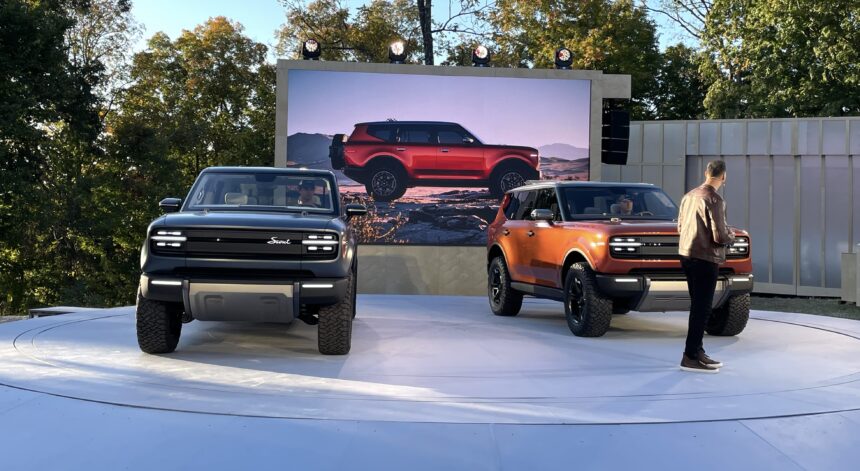Scout Motors is set to relaunch the vintage Scout brand with two new electric vehicle concepts, the Traveler SUV and Terra pickup truck. These American-made EVs are expected to hit the market in 2027 with prices starting at around $60,000. However, buyers will be eligible for current tax credits, making them a more affordable option for eco-conscious consumers.
Reservations for the Scout vehicles will open on October 24, with a $100 refundable deposit required. The company aims to tap into the growing trend of reviving classic nameplates for a new era, following in the footsteps of vehicles like the Ford Bronco and the Volkswagen ID.Buzz.
The new Scout vehicles will be assembled at a $2 billion factory in South Carolina, utilizing an all-electric platform. The Traveler SUV and Terra pickup truck will feature a mix of classic design elements and modern powertrain technology. They will offer four-wheel drive, solid rear axles, and front and rear mechanical locking differentials.
The Scout lineup will include full battery-electric vehicles with an estimated range of 350 miles, as well as plug-in hybrid options under the sub-brand Harvester. Harvesters will come equipped with an engine that serves as a generator to charge the battery pack and power the motors, providing an estimated total range of 500 miles.
The vehicles will feature a combination of old-school charm and modern technology, with mechanical door handles and analog controls alongside a 16.2-inch touchscreen and 12.3-inch digital instrument displays. Scout claims that 80% of repairs can be done at home, allowing owners to maintain their vehicles without needing to visit a dealership.
The Traveler SUV and Terra pickup truck are expected to be about 85% production-ready, with final versions set to hit the market in three years. Both models will offer unique features like a front bench seat and a swinging split tailgate, providing a level of customization not found in other electric vehicles on the market.
Scout’s partnership with Volkswagen Group, which recently invested $1 billion in American electric car maker Rivian, will bring cutting-edge technology to the Scout lineup. The vehicles will feature an 800-volt electrical architecture, DC fast charging capabilities, and bidirectional charging. They will also use the Tesla North American Charging Standard connector, potentially providing access to Tesla’s Supercharger network.
The Traveler SUV will come with dual-motor four-wheel drive, an estimated 1,000 lb-ft of torque, and a towing capacity of over 7,000 pounds. The Terra pickup truck will offer similar performance, with dual-motor four-wheel drive, a 0-60 mph time of 3.5 seconds, and a towing capacity of over 10,000 pounds.
With their blend of classic design and modern technology, the Scout Traveler and Terra promise to offer a unique driving experience for consumers looking for a nostalgic yet eco-friendly option in the electric vehicle market. The Impact of Climate Change on Biodiversity
Climate change is one of the biggest threats facing the planet today, and its effects are being felt across the globe. One of the most significant impacts of climate change is on biodiversity, as rising temperatures and changing weather patterns are causing disruptions to ecosystems and threatening the survival of many species.
One of the key ways in which climate change is affecting biodiversity is through habitat loss. As temperatures rise, habitats that were once suitable for certain species are becoming inhospitable, forcing plants and animals to migrate to new areas or face extinction. This can lead to a loss of biodiversity as species struggle to adapt to their changing environments.
In addition to habitat loss, climate change is also leading to changes in the distribution and abundance of species. Some species may be able to thrive in warmer temperatures, while others may struggle to survive. This can disrupt the delicate balance of ecosystems, leading to declines in populations of certain species and potential cascading effects on other species that rely on them for food or shelter.
Climate change is also causing shifts in the timing of natural events, such as flowering and migration patterns. These changes can have far-reaching consequences for biodiversity, as species may become out of sync with their food sources or predators, leading to declines in populations or changes in species composition.
Another way in which climate change is impacting biodiversity is through the increased frequency and intensity of extreme weather events. Hurricanes, droughts, wildfires, and floods can all have devastating effects on ecosystems and the species that inhabit them. These events can lead to widespread habitat destruction, population declines, and even extinctions.
Despite the grim outlook, there are steps that can be taken to mitigate the impacts of climate change on biodiversity. Conservation efforts, such as habitat restoration and protection, can help to preserve important habitats and provide refuges for species that are struggling to cope with changing conditions. Additionally, efforts to reduce greenhouse gas emissions and slow the pace of climate change can help to lessen the impact on biodiversity in the long term.
In conclusion, climate change is having a profound impact on biodiversity, with potentially devastating consequences for ecosystems and the species that inhabit them. It is crucial that we take action now to address the root causes of climate change and protect the planet’s biodiversity for future generations. Only through concerted efforts to reduce emissions and protect habitats can we hope to preserve the rich diversity of life on Earth.







